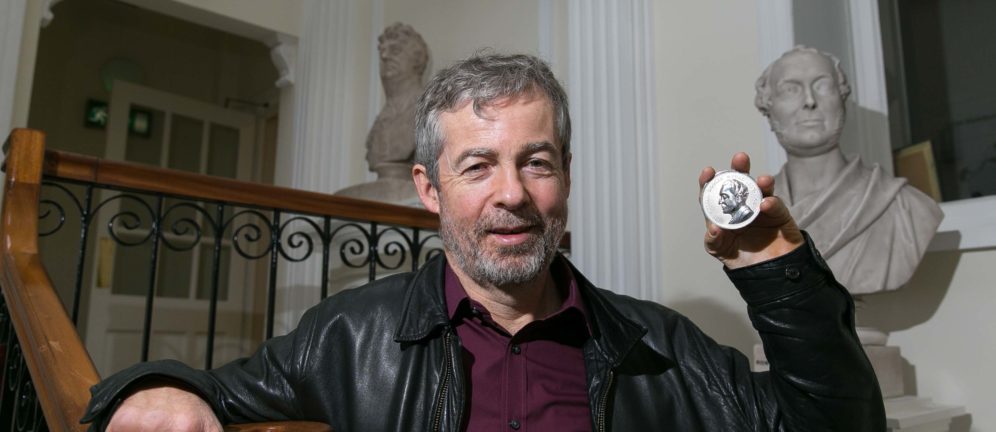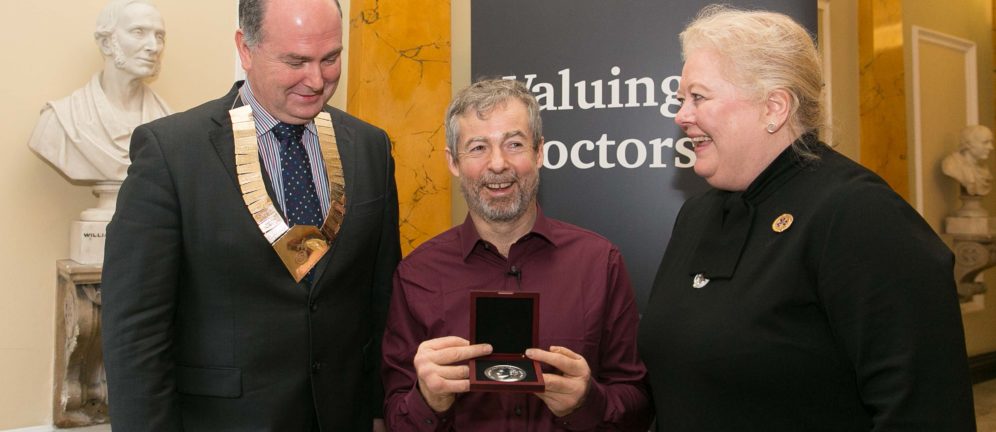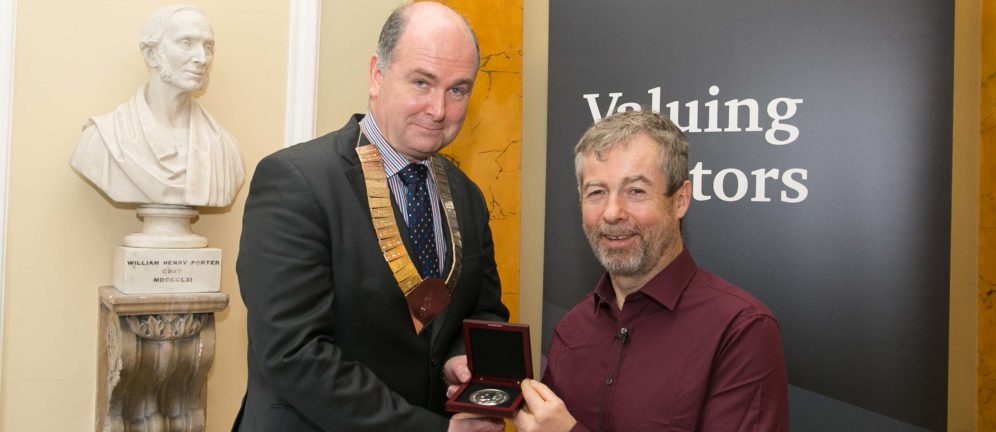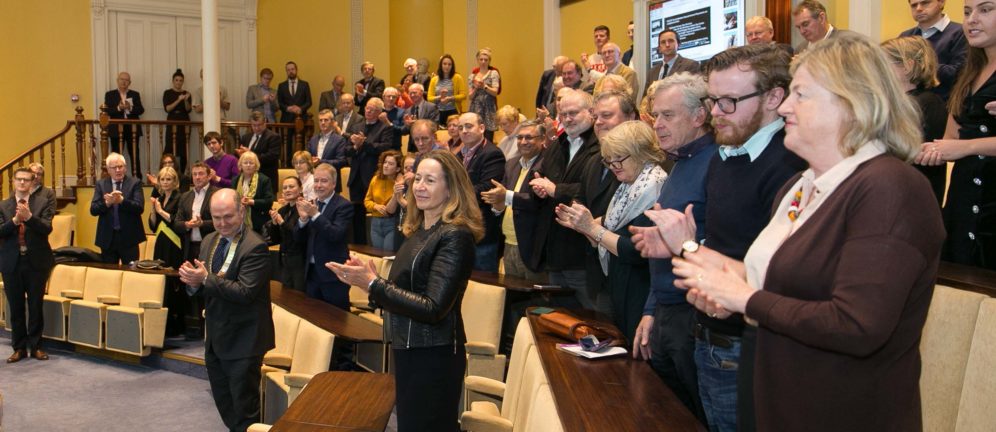Doolin Lecture 2018: Dr. Austin O’Carroll: ‘Eradicating Stigma as a Barrier to Access’ Saturday 8th Dec 2018.
Dr. Austin O’Carroll is a North Dublin inner city GP since 1992. He provides care to a population with a high burden of illness and social deprivation. He is the founder of numerous services for homeless and disadvantaged families including the Mountjoy family practice. He is the recipient of many awards in recognition of his work with the poor. He is the motivating force behind an organization called Safetynet, providing healthcare for the homeless.
O’Carroll introduced the concept of stigma, which is of central importance to his daily work. His understanding of stigma is that of a mark that defines a person in a negative way. He went on to state that stigma is one of the great barriers to healthcare. The downstream consequence is that if vulnerable individuals are denied medical services, they die at a young age. The health statistics plummet when a person is homeless. Homelessness is the end point of poverty. The majority of the homeless come from a background of poverty. The life expectancy among the homeless is 46 years. Currently 25% of homeless families with children can’t access GP care.
Society’s triple adverse hit is described. Hit one is being born into poverty. Hit two is determining that you have a personality disorder. Hit three is informing you that you can’t be helped because you have a personality disorder.
Life when viewed from the homeless person’s perspective, it is very harrowing. When sitting on the street, people walk by with no eye contact. They feel that are viewed as a bum or a beggar. This lack of empathy and understanding frequently extends to the healthcare professionals. Many have experienced negative treatment in our hospitals. Doctors may behave in an unsympathetic manner when they are already overburdened with a heavy load of ill patients. This is a lost opportunity. An encounter with medical services could offer an opportunity to change the life of a disadvantaged person. Numerous examples were given of people whose circumstances were transformed by the right support at the right time.
The deconstruction of disability was another theme of the lecture. Disability is a social construction. In essence it means that the individual differs from the others around him. O’Carroll illustrated this point with a number of scenarios. If one landed on another planet where there was a life form like humans except for no eyes. In that situation a person who could see would be deemed as disabled in that special arrangements would have to be put in place to allow him to fit in with that society. In a second example he described a planet where the life form had no legs. Everybody would be in wheelchairs. In that society an ambulant individual would be considered as the one with the disability. In simple terms, the disabled are those who do not fit in with the prototype.
O’Carroll challenged the current teachings on learning disabilities. Dyslexia is considered a disability but being not able to draw and paint isn’t. The latter is considered to be just a lack in an isolated skill. A learning disability is defined as being outside the accepted scientific cut-off points. These cut-offs are arbitrary. Hyperactivity and destructive behavior are used to describe children who are unable or want to sit in a classroom for many hours at a time. These are all examples of social construction.
The plight of drug addicts was described in some detail. As a group they get very little sympathy. The common perception is that it is their own fault. If their addiction were viewed as a medical disease, the services for them would be better. The social stigma of drug dependency is a major obstacle when looking for funding for their care. It is estimated that only 240 GPs prescribe Methadone and only 750 pharmacies dispense it. Many drug addicts living in rural areas are compelled to travel long distances to obtain either their prescription or their medication.
O’Carroll has some novel ideas about Psychiatry. He makes the distinction between a disease and an illness. A disease has an underlying pathology. An illness is a list of symptoms. He maintains that Schizophrenia is the only one associated with a pathology. Many of the other psychiatric conditions are a list of symptoms, many being associated with changing serotonin levels. It is his opinion that loneliness is a major factor in many cases of depression.
He described the medical gaze. When doctors come into contact with harrowing clinical circumstances their training teaches them not to display their emotions. On the other hand when they encounter similar distressing scenes at a movie, they are likely to express their feelings.
A short video was shown of GP trainees’ reaction to a NDCGP Social Medicine Special Interest Placement programme. During the programme they come in contact with the Safetynet primary care services, the Ushers day centre, the HSE refugee reception centre, the Mental Health Team for homeless people, the Dochas centre Irish prison services, and the HSE addiction services. All the trainees conduct patient consultations during the rotation. The trainees who were interviewed stated it was a very positive experience. One trainee said that she was struck by the fact that anybody can become homeless. Another found that the Capuchin food hall, where they serve meals, is a good opportunity to interact with homeless patients.
Towards the end of his lecture O’Carroll told the distressing story of the ‘waif’ who is now in terminal poor health. She was a 23 year old woman with TB who refused to take her TB medications. She displayed swings between passivity and outrage. The reason that she gave for not taking her medication was that the services called to her door at 10:00 and she never got up before 11:00. Although this problem was dealt with, she subsequently went on to develop severe arthritis and is now wheelchair bound. Her background was that she was in foster care from a young age. She rotated through a series of foster parents. One pair of foster parents bound and gagged her for her poor behaviour. Another foster parent sexually abused her.
At the end of his lecture O’Carroll received a standing ovation for his memorable, moving account of how, as a doctor, he has tackled the problems of stigma, disability, homelessness, drug addiction, and psychiatric problems. He has shone a light on the marginalized and vulnerable groups within modern Irish society.
JFA Murphy
Editor
P830





